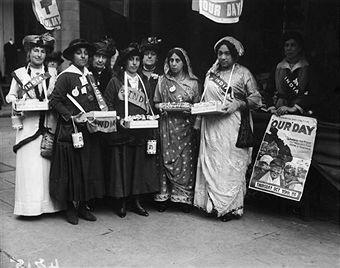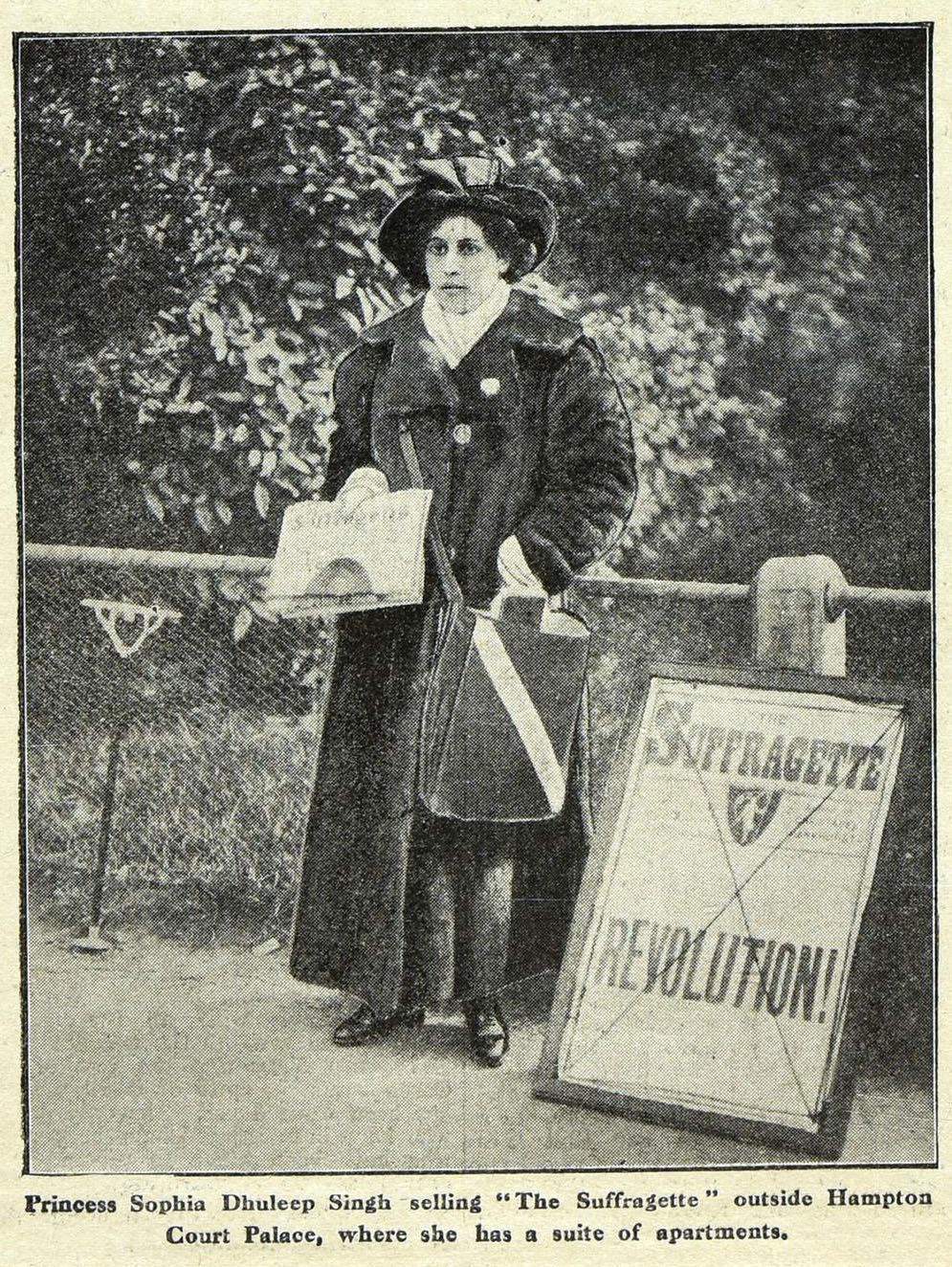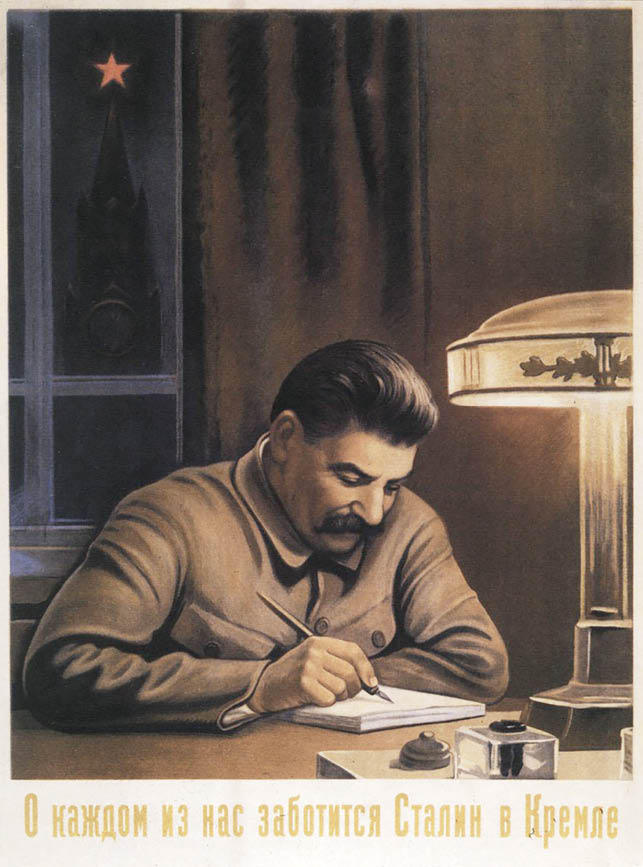Spotlight On: Sophia Duleep Singh, the Princess Suffragette
Today, the spotlight is being cast on Sophia Duleep Singh whose heritage was from the ruling elite of India but this was taken from her family due to the rise of British Imperialism. Born and raised in England, Sophia became prominent in British aristocracy before finding her political voice and fighting against the oppression inflicted by the British Government in various realms.
 |
| From top and left to right: Catherine Hilda, Bamba Sutherland, and Sophia. via Wikipedia |
Early Life in Aristocracy
Sophia was born in Belgravia (an affluent district in London) in 1876. Her Father was Maharaja Duleep Singh, the last Maharaja of the Sikh Empire whilst her mother was the illegitimate daughter of a German merchant and Abyssinian slave. The Maharaja was deposed from his throne aged 11 when Britain annexed the Punjab state and he was removed from his kingdom by the British East India Company. He was exiled to Britain where he converted to Christianity and was held closely and favourably to the Royal Family. This meant that Sophia was born and raised within the British aristocracy, living on a luxurious estate in Suffolk know as Elveden Hall. Anita Anand describes the extravagance of the home stating,
"Outside, leopards scowled through the drizzle and baboons picked fights with local jackdaws. There was an air of madness, extravagance and decay at Elveden, exemplified by the sight of Indian hawks and jewelled parrots which regularly fell out of the trees, defeated by the hostile climate."
A Change of Heart
In around 1885/6 the Maharaja began to question the legality of the British crown taking his throne. Sophia's father's promiscuity and extravagance led to him not being able to pay off his debts. This paired with his resentment led him to essentially denounce the royal family whom he believed had robbed his wealth. The Maharaja uprooted his family in an attempt to flee back to Punjab in the hope of causing an uprising. However they were caught at the port of Aden. Sophia's father dedicated the rest of his life to attempting to reclaim his lost kingdom.
Sophia was 'rescued' by her godmother, Queen Victoria, who took care of her and family on their return from their failed attempt to flee. Following the death of Sophia's mother, Queen Victoria ensured that she was schooled and provided her with a house at Hampton Court Palace. Evidently, Sophia was still very much welcome in the Royal Family despite her Father's actions and opinions. During this time Sophia served as a fashion icon, one of the first women to ride a bike and a regular competitor of Crufts.
Entering the Political Realm
In 1903, Sophia and her sisters wished to attend the Dehli Durbar - a celebration of the coronation of Edward VII. Going again the wishes of the Secretary of State for India, Sophia sneaked into India, despite being exiled. This was to be such a transformative trip for Sophia. On this trip, Sophia saw Indians being treated like second class citizens in their own country, subject to famine and suffering.
In 1906-7 Sophia visited her sister, Bamba, in Lahore which was the capital of their Father's former kingdom. This is where Sophia began to become politicised, meeting the freedom fighters, Gopal Krishna Gokhale and Lala Lajpat Ra (of the Swadeshi Movement), who both played a significant role in the Indian Independence Movement. Following this, Sophia developed an anti-colonialist stance.
 |
| Ladies Day 1916 - Topical Press Agency/Hulton Archive/Getty Images |
The Suffragettes
On her return to Britain, Sophia began to gain interest in the women's suffragette movement. She associated the oppression of Indians with the oppression of women, especially since the former Viceroy for India, Lord Curzon, was the president of the National League for Opposing Women's Suffrage.
Sophia joined the Women's Society for Social and Political Union and found herself in Emmeline Pankhurst's inner circle. Becoming a prominent activist of her time, Sophia drove press carts through London, refused to pay her taxes and sold copies of suffragette publications outside Hampton Court Palace, where she had previously had a home. Sophia's support for the movement never dwindled, even as it became increasingly violent. She even became involved in violence herself such as at the 1910 Black Friday marches which were met with significant police brutality and Sophia herself got into a fight with a police officer who she had seen battering her friend.
One of her most significant roles was as a member of the Women's Tax Resistance League who peddled the motto, "no vote, no tax". Sophia claimed:
"When the women of England are enfranchised and the State acknowledges me as a citizen I shall, of course, pay my share willingly to its upkeep"
Sophia was prosecuted on several occasions for not paying her taxes and not paying for licenses for various thing such as carriages, servants and her dogs. As a result, her jewellery was taken from her to be auctioned. Her fellow suffragettes had her back since they attended the auctions and reclaimed her confiscated items. The advancement of women was a clearly a cause that Sophia held close to her heart and threw all of her passion into.
Sophia's work for the suffrage movement made her an embarrassment to the royal family and also deemed her a nuisance to many government officials, including Winston Churchill and George V, which resulted in her being under heavy surveillance.
 |
| Sophia as a First World War Nurse (Source) |
Following the outbreak of the First World War, like many women, Sophia set aside her battle for the advancement of women in order to support the war effort. During this time she was a nurse and provided funds and clothing for Indian soldiers who were poorly equipped for the Western Front.
Post War
Following the war, Sophia joined the Suffragette Fellowship and became its president following Pankhurst's death. Sophia dedicated the remainder of her life to advanced the position of women. When asked what her interests were by Who's Who, Sophia simply responded the advancement of women.
Further Reading:
British Library, "Sophia Dunleep Singh: Princess & Suffragette". https://www.bl.uk/votes-for-women/articles/sophia-duleep-singh-princess-and-suffragette
Sophia Dunleep Singh http://historysheroes.e2bn.org/hero/whowerethey/3521
History of Elveden https://www.elveden.com/history





